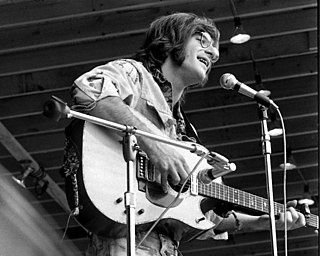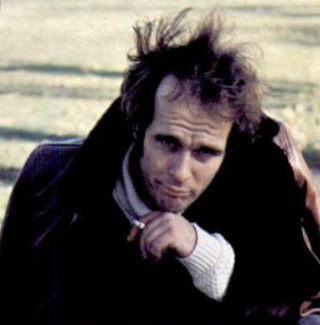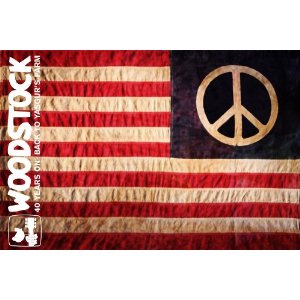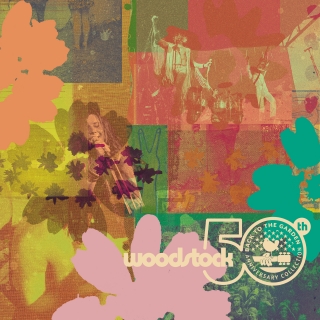Related Research Articles

Woodstock Music and Art Fair, commonly referred to as Woodstock, was a music festival held during August 15–18, 1969, on Max Yasgur's dairy farm in Bethel, New York, United States, 40 miles (65 km) southwest of the town of Woodstock.

John Benson Sebastian (born March 17, 1944) is an American singer, songwriter and musician who founded the rock band the Lovin' Spoonful. He made an impromptu appearance at the Woodstock festival in 1969 and scored a U.S. No. 1 hit in 1976 with "Welcome Back."

Paul Vaughn Butterfield was an American blues harmonica player, singer and bandleader. After early training as a classical flautist, he developed an interest in blues harmonica. He explored the blues scene in his native Chicago, where he met Muddy Waters and other blues greats, who provided encouragement and opportunities for him to join in jam sessions. He soon began performing with fellow blues enthusiasts Nick Gravenites and Elvin Bishop.

Woodstock '94 was an American music festival held in 1994 to commemorate the 25th anniversary of the original Woodstock festival of 1969. It was promoted as "2 More Days of Peace and Music". The poster used to promote the first concert was revised to feature two catbirds perched on the neck of an electric guitar, instead of the original one catbird on an acoustic guitar.

James Timothy Hardin was an American folk and blues musician and composer. As well as releasing his own material, several of his songs, including "If I Were a Carpenter" and "Reason to Believe", became hits for other artists.
Woodstock '89 or "The Forgotten Woodstock" was a rock concert that took place in August 1989 on the site of the original Woodstock concert of 1969 as a spontaneous celebration of the event's 20th anniversary.

Michael Scott Lang was an American concert promoter, producer, and artistic manager who was best known as a co-creator of the Woodstock Music & Art Festival in 1969. Lang served as the organizer of the event, as well as the organizer for its follow-up events, Woodstock '94 and the ill-fated Woodstock '99. He later became a producer of records, films, and other concerts, as well as a manager for performing artists, a critically acclaimed author, and a sculptor.
Arthur Lawrence Kornfeld is an American musician, record producer, and music executive. He is best known as the music promoter for the Woodstock Festival held in 1969. Kornfeld is also known for his collaborations with Artie Kaplan.

Woodstock: Music from the Original Soundtrack and More is a live album of selected performances from the 1969 Woodstock counterculture festival officially known as "The Woodstock Music & Art Fair". The album was compiled & produced by Eric Blackstead. Originally released on Atlantic Records' Cotillion label as a triple album on May 11, 1970, it was re-released as a 4 CD box by Mobile Fidelity Sound Labs in 1986 followed by a two-CD set released by Atlantic in 1987. Atlantic re-issued the two-CD set in 1994 correcting a few mastering errors found on their 1987 release. Veteran producer Eddie Kramer along with Lee Osbourne were the sound engineers during the three-day event.

Eric Andersen is an American folk music singer-songwriter, who has written songs recorded by Johnny Cash, Bob Dylan, Judy Collins, Linda Ronstadt, the Grateful Dead and many others. Early in his career, in the 1960s, he was part of the Greenwich Village folk scene. After two decades and sixteen albums of solo performance he became a member of the group Danko/Fjeld/Andersen.

Arthur Roy Traum was an American guitarist, songwriter, and producer. Traum's work appeared on more than 35 albums. He produced and recorded with The Band, Arlen Roth, Warren Bernhardt, Pat Alger, Tony Levin, John Sebastian, Richie Havens, Maria Muldaur, Eric Andersen, Paul Butterfield, Paul Siebel, Rory Block, James Taylor, Pete Seeger, David Grisman, Livingston Taylor, Michael Franks and Happy Traum, among others. Traum's songs were featured on PBS, BBC, ESPN, CBS, and The Weather Channel. He toured in Japan, Europe and the U.S.

The Newport Pop Festival, held in Costa Mesa, California, on August 3–4, 1968, was the first music concert ever to have more than 100,000 paid attendees. Its sequel, billed as Newport 69, was held in Northridge, California, on June 20–22, 1969, and had a total attendance estimated at 200,000.

The Harlem Cultural Festival was a series of events, mainly music concerts, held annually in Harlem, Manhattan, New York City, between 1967 and 1969 which celebrated African American music and culture and promoted Black pride. The most successful series of concerts, in 1969, became known informally as Black Woodstock, and is presented in the 2021 documentary film Summer of Soul.

Mikhail Horowitz is an American poet, performance poet, parodist, satirist, social commentator, author and editor.

Woodstock 40 Years On: Back to Yasgur's Farm is a six-CD live box-set album of the 1969 Woodstock Festival in Bethel, New York. Its release marked the 40th Anniversary of the festival.

Woodstock: Three Days of Peace and Music is a 4-CD live box-set album of the 1969 Woodstock Festival in Bethel, New York. Its release marked the 25th anniversary of the festival. The box set contains tracks from Woodstock: Music from the Original Soundtrack and More, Woodstock 2, and numerous additional, previously unreleased performances from the festival as well as the stage announcements and crowd noises. Just prior to the box set's release, Atlantic Records released a much shorter 1-CD version entitled The Best of Woodstock. In 2019, Rhino Records issued a 38-CD box set called Woodstock – Back to the Garden: The Definitive 50th Anniversary Archive which includes every musical performance as well as stage announcements and other ancillary material.
Homespun offers music instruction for many instruments and styles on CD, DVD and streaming media.
The Colwell-Winfield Blues Band was an American blues band formed in 1968.

Woodstock – Back to the Garden: The Definitive 50th Anniversary Archive is a live album by various artists, packaged as a box set of 38 CDs. It contains nearly all of the performances from the Woodstock music festival, which took place on August 15–18, 1969, in Bethel, New York. The CDs also include many stage announcements and miscellaneous audio material. The box set also contains bonus material such as a Blu-ray copy of the director's cut of the Woodstock documentary film, a hardcover book written by concert promoter Michael Lang, and a replica of the original concert program. It was released by Rhino Records on August 2, 2019, in a limited edition of 1,969 copies.

Woodstock – Back to the Garden: 50th Anniversary Collection is a live album by various artists. It was recorded at the Woodstock music festival, which took place on August 15–18, 1969, in Bethel, New York. It includes 30 songs by 21 different musical artists, in order of performance, along with a number of stage announcements. It was released as a three-disc CD and as a five-disc LP on June 28, 2019.
References
[1] [2] [3] [4] [5] [6] [7] [8] [9] [10] [11] [12] [13]
- ↑ 1. “Hippy Festival Upstate Is Cool Amid the Bonfires,” The New York Times, (September 3, 1967), 22.
- ↑ 2. “Sound-Out,” The Woodstock Week, (September 7, 1967), 1.
- ↑ 3. “Ground-Out,” The Woodstock Week, (April 3, 1968), 1.
- ↑ 4. Weston Blelock and Julia Blelock, Roots of the 1969 Woodstock Festival: The Backstory to “Woodstock,” (Woodstock, NY: WoodstockArts, 2009), 126.
- ↑ 5. “On the Sound Festival…,” The Woodstock Week, (July 18, 1968).
- ↑ 6. “Sound Festival Sounder Than Its Neighbors…,” The Woodstock Week, (August 23, 1968), 1.
- ↑ 7. Blelock, Roots of the 1969 Woodstock Festival: The Backstory to “Woodstock,” 27-8.
- ↑ 8. Blelock, Roots of the 1969 Woodstock Festival: The Backstory to “Woodstock,” 136.
- ↑ 9. “Sound Festival Off for This Saturday,” Daily Freeman, (July 31, 1970), 2.
- ↑ 10. “Sound Festival Action Dismissed,” Daily Freeman, (September 10, 1970), 8.
- ↑ 11. Bonnie Langston, “Spirit of 1969 Returns to Woodstock,” Preview, Daily Freeman, (August 8, 2008), 3, 6.
- ↑ 12. Bob Margolis, “Black & Blues: Bearsville Theater Spotlights Blues Magoos, Hubert Sumlin, Ellen McIlwaine and Marc Black This Saturday,” Ulster Publishing’s Alm@nac, (August 13, 2009), 9.
- ↑ 13. Tim Malcolm, “40 Years of Peace, Love and Rock Music,” Times Herald-Record, (August 14, 2009), 12B-13B.
Further Reading
Peter Applebome, “50 Miles and 40 Years From Yasgur’s Farm, Woodstock Tries to Move on,” The New York Times, Our Town/NY/Region (August 12, 2009), 1.
Weston Blelock and Julia Blelock, Roots of the 1969 Woodstock Festival: The Backstory to “Woodstock,” (Woodstock, NY: WoodstockArts, 2009).
Michael Lang with Holly George-Warren, The Road to Woodstock, (New York, NY: Ecco, 2009).
Jennifer Leba, “By The Time We Got To Woodstock,” Hudson Valley Magazine, (August 2009), 60–1.
Jean Young and Michael Lang, Woodstock Festival Remembered, (New York, NY: Ballantine Books, 1979).